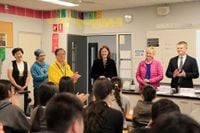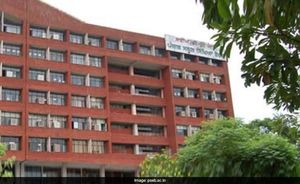As Australia approaches its federal election on May 3, 2025, both major political parties are vying for the support of multicultural communities by promising substantial investments in community language schools. Prime Minister Anthony Albanese has pledged $25 million to support the country’s 600 community language schools, emphasizing the importance of cultural diversity in Australia.
In a statement released on April 27, Albanese highlighted that nearly half of Australians were either born overseas or have at least one parent who was. This demographic reality underscores the significance of language education in fostering social inclusion and cultural connection.
“Community Language Schools strengthen our social inclusion by supporting young Australians – primarily from culturally and linguistically diverse backgrounds – to learn or maintain a language other than English,” Albanese said. “This program connects students to the languages of their parents, grandparents, and broader communities.”
The promised funding aims to help over 90,000 students learn 84 languages across these dedicated schools. Among the initiatives included in this pledge is a $5 million investment directed towards a specialist Asian languages funding stream. This funding will support fluency in Asian languages through to Years 11 and 12, targeting languages spoken by Australia’s largest trading partners and neighbors.
Albanese noted that this investment would not only enhance educational opportunities but also open further employment pathways for students. “This will open further employment opportunities and career paths for students, and grow economic ties with our friends and neighbors across our region,” he added.
Meanwhile, the Opposition leader, Peter Dutton, has made a competing promise, pledging $4.5 million to establish a Greek Cultural and Language Enrichment Centre in Oakleigh. In an exclusive interview with Neos Kosmos, Dutton stated that a Coalition government would match similar pledges made by Labor to Greek communities in Australia, totaling nearly $12 million if elected.
“The Coalition values the contribution of these schools in promoting language learning, strengthening social cohesion, and equipping young Australians with the skills to succeed in an increasingly globalized economy,” said Shadow Minister for Education Sarah Henderson.
Henderson confirmed the Coalition’s commitment to community language schools, which teach over 90,000 students nationwide. “Community language schools are a pillar of Australia’s multicultural success story,” she emphasized. “This commitment will help the next generation stay connected to their family histories, their mother tongue, their cultural identities, and the broader story of Australia’s multicultural success.”
Henderson also highlighted the importance of multilingual skills, especially in relation to trade and diplomacy. “The ability to speak a second or third language—especially those of our key regional partners—also opens doors in trade, diplomacy, and business,” she said.
Both parties are framing their investments as crucial to maintaining Australia’s multicultural fabric. Albanese’s announcement comes as part of a broader strategy to appeal to diverse communities, while Dutton’s response aims to counter by showcasing the Coalition’s ongoing commitment to multiculturalism.
“Unlike Labor’s record of neglect, the Coalition has always championed Australia’s multicultural communities—recognizing that our diversity is one of our greatest national strengths,” said Hon Jason Wood MP, Shadow Minister for Community Safety, Migrant Services, and Multicultural Affairs.
As the election date draws near, the promises made by both leaders reflect a keen awareness of the importance of multiculturalism in Australian society. The funding commitments are seen as vital for not only preserving cultural heritage but also enhancing the economic prospects of future generations.
With the stakes high and the electorate increasingly diverse, how these commitments will resonate with voters remains to be seen. However, both parties seem committed to ensuring that community language schools continue to thrive as a cornerstone of Australia's multicultural identity.
As the final week of campaigning unfolds, the focus on education and cultural inclusivity is likely to dominate discussions, shaping the electoral landscape as Australians prepare to cast their votes.




